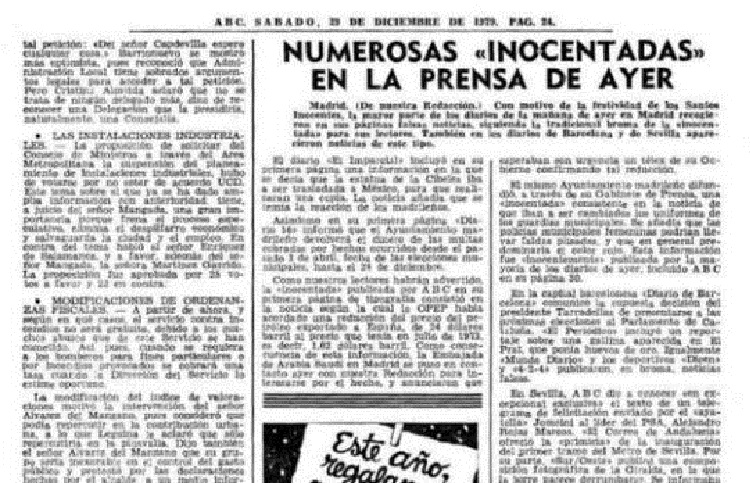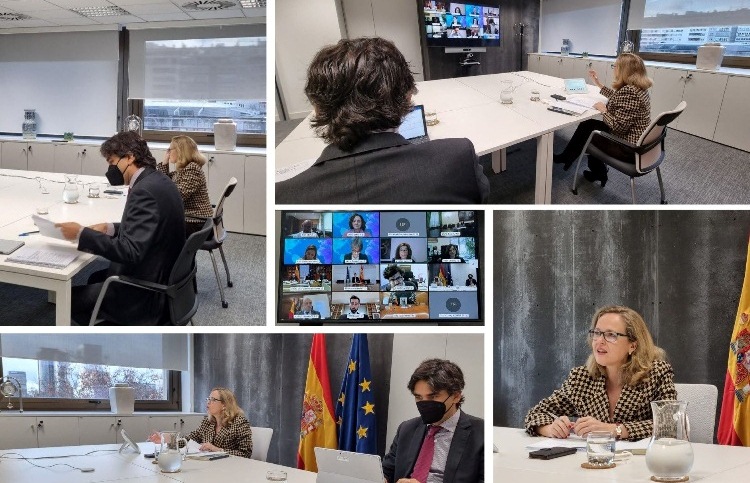Eduardo González
Before the fake news became fashionable all over the world, Spain was already dealing with a particularly picturesque version of this phenomenon: the jokes published in the press on December 28, Day of the Innocents.
In general, most of the press jokes have avoided the most thorny issues, but there has been everything: from the usual impossible signings (Leo Messi for Real Madrid or Cristiano Ronaldo for Barcelona), to carefully invented accidents (the collapse of the Viaduct in Madrid, with its corresponding photomontage, was the first invictice in the history of ABC, published in 1905, only two years after the appearance of the newspaper), passing through other more or less ingenious or current “news”, such as the 12-1 repetition to Malta or the Government’s decision to ban the bold letters to save ink.
As regards the diplomatic world, the most remembered and “successful” joke was published by ABC on December 28, 1979, exactly 42 years ago today. In the middle of the oil crisis, the Madrid newspaper could not think of anything better than “to inform” that OPEC had decided to reduce the price of crude oil exported to Spain from $ 24 per barrel (the real price of July 1973) to only $ 1.62.
As a consequence of this news, according to ABC‘s own report the following day, “the Embassy of Saudi Arabia in Madrid contacted the editorial office to inquire about the fact and they were waiting urgently for a telex from their Government confirming such a reduction”.
Another joke less sounded but no less ingenious was published by the newspaper El Día, Santa Cruz de Tenerife, which “reported” that Marcelo Caetano, president of Portugal between 1968 and 1974 and last dictator of the country before the Revolution of the Claveles, had arrived at the Los Rodeos airport, which was accompanied by a skilful photomontage in which the Portuguese president was seen coming down the flight of an airplane.
As the late Francisco Ayala, director of the newspaper in 1978, recalled, “the local authorities and, what is worse, the Portuguese consul in Tenerife set out to greet the illustrious guest”.
Apart, a journalist from the newsroom “who was also a correspondent for a national news agency” even gave the news to this agency including a chronicle, “also invented”, of the president’s stay in Puerto de la Cruz and elsewhere of the Island. The curious thing is that the journalist was not in the newsroom when the joke was plotted, so when he published his chronicle he was convinced that the news was true.
After the publication of the “news”, the Portuguese consul contacted the editorial office to say that he had been called from the Embassy of his country in Madrid, “asking him for not communicating the news of the arrival in the Canary Islands. president“, and that he was” worried about the consequences “.
The Feast of the Holy Innocents
The Feast of the Holy Innocents commemorates the massacre ordered by King Herod against all children under two years after the Magi announced that the future king of the Jews was born, as the Gospel of St. Matthew tells us.
Over the centuries, the Christian festivity collected elements from other more pagan celebrations, such as the Saturnalias or the abundant Days of the Madmen that were celebrated everywhere, and became the day par excellence of the jokes in the countries of fort Catholic tradition, such as Spain and the Latin American nations. Elsewhere, like France or the Anglo-Saxon world, April Fools’ Day is celebrated on April 1.
Apart from the joke items that are sold in the markets of the Plaza Mayor in Madrid, the joke par excellence in Spain has always been the placement of a white paper dummy on the back of the “victims”, to the point of becoming in the iconic image par excellence of the Day of the Innocents.







